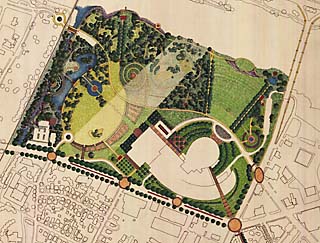Double Vision
When in Doubt...
By Jenny Staff, Fri., July 30, 1999
The council will have to keep watching the park development closely over the next 10 years. And throughout that time, the city could incorporate elements of the Coalition's plan without damaging the concept of the park as we know it, as several council members seem to agree.
Coalition members say they just want to be part of the process. "We want to be a participant in an official capacity when the landscape architect is hired" to design the park, said Barbee.
Nevertheless, there is danger in too much compromise. Restaurants for their own sake, for example, will not enhance the park. More restaurants or other commercial establishments would bring in traffic for -- and require more parking for -- people who are not there to use the park. And this part of Austin is not hurting for places to eat -- witness the row of restaurants that runs virtually through Zilker Park. (Maybe a good idea would be to provide easy pedestrian access from the current restaurant row to the park.) "And what kind of prices will the restaurants charge?" asked Slusher. "Will they just be another gathering place for the elite?"
Swinging Gates
The council also unanimously approved annexation of, and PUD zoning for, the Balfour Tract, which spreads across some 600 acres near Bee Caves Road and Senna Hills Drive, in the southwest hinterlands not far from Hwy 71. The development will comply with SOS, including the 20% impervious cover limits in place for that part of the aquifer.
Having resolved major issues like utility service (the city is pleased about being able to try out the decentralized "cluster" wastewater system, which means no new sewer line), the main sticking point was the issue of whether the development would be a gated one. Since the tract is adjacent to Commons Ford, a city park with picnic facilities and lake access, the developer feared that wayward swimmers would be traipsing through the back yards and open spaces of his peaceful lakeside neighborhood (à la John Cheever's "The Swimmer"). Already ceded one gate in the compromise process, the developer wanted one more, and the option to petition the Planning Commission for as many gates as he pleased. Current zoning would allow no gates, and no chance for more without a zoning change.
|
|
Council Member Beverly Griffith suggested the city would keep the intruders out with strongly worded signs, prohibiting lake access and directing people to Commons Ford. Attorney Richard Suttle, representing the developer, Jay Hawes, argued that under limited-purpose annexation, there would be "no police out there. How would it be enforced? You don't have anybody coming out here." Parks director Jesus Olivares assured the council that despite occasional vandalism, theft of signs was not an epidemic problem in Austin parks. "We could take care of it," he said.
Slusher, Spelman, Griffith, and Willie Lewis came out early against the gates. Then Mayor Pro Tem Jackie Goodman noted that one of the principles of Smart Growth was "to try to get away from this constant gated community, private road" thing. "It's kind of a self-fulfilling prophecy -- [you] create a surprise package, somebody wants to open up," Goodman said. So it looked like the gates were in trouble, until Mayor Kirk Watson delicately pointed out that rejecting the gate request could jeopardize the annexation compromise.
"It's not an ultimatum," said Hawes. "Whether you approve the gate or not, we're still going to go forward." But a last-minute plea by Suttle, listing the city's benefits in the annexation, gained him some ground: Hawes, he argued, is allowing "a voluntary way to see if our city can provide sewer service without extending water pipes. He's playing ball with the city to do this. ... He's asking for a break in exchange for a lot of things he's offering the city." The council decided on a compromise: to allow Hawes the one extra gate, where the potential of drop-in lake visitors was highest, but not allow him to petition the Planning Commission for additional gates.
This Week in Council: The meeting begins at 9am today for special briefings on council budget initiatives and the progress of the Goggio consulting team in studying the city's federally qualified health clinics (FQHC) -- though word has it the budget initiatives briefing will be postponed to next week. Later in the day, look for a vote on the Town Lake Park master plan (and the funding needed to get the project started), as well as decisions from the council on which projects will go to the Texas Department of Transportation to compete for federal TEA-21 funding (see last week's "Council Watch"). The council will also consider a resolution creating the long-awaited Community Court, which would deal with repeat Class C misdemeanor (i.e., public nuisance) offenders, and provide social services geared toward rehabilitation.
Got something to say on the subject? Send a letter to the editor.









